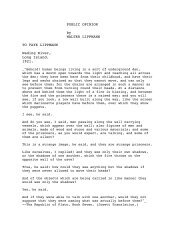Tacit Knowing: Its Bearing on Some Problems of Philosophy
Tacit Knowing: Its Bearing on Some Problems of Philosophy
Tacit Knowing: Its Bearing on Some Problems of Philosophy
You also want an ePaper? Increase the reach of your titles
YUMPU automatically turns print PDFs into web optimized ePapers that Google loves.
Michael Polanyi http://faculty.uml.edu/rinnis/45.301%20Ways%20<strong>of</strong>%20Knowi...<br />
frog’s computed future topographies, the physiology <strong>of</strong> a frog.<br />
And, <strong>of</strong> course, what is true for its atomic topography, is equally<br />
true for a physical-chemical topography <strong>of</strong> the frog; we could<br />
perceive in it nothing <strong>of</strong> the frog.<br />
If we could rely <strong>on</strong> our awareness <strong>of</strong> the data forming a<br />
topography for attending to their joint meaning, the topography<br />
would become transparent, in the same sense as a text is<br />
transparent when we read and understand it. But since this is not<br />
possible, it can <strong>on</strong>ly block our view by its meaningless body -<br />
even as a text does, when we c<strong>on</strong>centrate our attenti<strong>on</strong> <strong>on</strong> its<br />
physical details.<br />
When <strong>on</strong>e reaches the c<strong>on</strong>clusi<strong>on</strong> that an assumpti<strong>on</strong><br />
widely taken for granted during a l<strong>on</strong>g time is patently false, <strong>on</strong>e<br />
asks <strong>on</strong>eself, how such an error could have arisen and been<br />
perpetuated. The answer in this case is not far to seek. The<br />
Laplacean c<strong>on</strong>cepti<strong>on</strong> <strong>of</strong> universal knowledge, as well as its<br />
modern equivalents, are models <strong>of</strong> a completely formalized, or<br />
mathematical, representati<strong>on</strong> <strong>of</strong> the universe. And ever since the<br />
middle <strong>of</strong> the eighteenth century, science has inflexibly set itself<br />
the ideal <strong>of</strong> casting all knowledge into mathematical form.<br />
Descriptive sciences were to be regarded as imperfect, immature<br />
branches <strong>of</strong> knowledge, that would sometime be replaced by<br />
definitive mathematical formulati<strong>on</strong>s.<br />
But this ideal is logically absurd. Imagine a set <strong>of</strong><br />
mathematical formulas that would answer any questi<strong>on</strong>s that we<br />
might ask about matters <strong>of</strong> experience. The object <strong>of</strong> such<br />
experience must be other than the mathematical formulas which<br />
are to explain it and hence these formulas are meaningless unless<br />
they bear <strong>on</strong> n<strong>on</strong>-mathematical experiences. In other words, we<br />
can use our formulas <strong>on</strong>ly after we have made sense <strong>of</strong> the world<br />
to the point <strong>of</strong> asking questi<strong>on</strong>s about it and have established the<br />
bearing <strong>of</strong><br />
615<br />
the formulas <strong>on</strong> the experience that they are to explain.<br />
Mathematical reas<strong>on</strong>ing about experience must include, beside<br />
the antecedent n<strong>on</strong>-mathematical finding and shaping <strong>of</strong><br />
experience, the equally n<strong>on</strong>-mathematical relating <strong>of</strong> mathematics<br />
to such experience and the eventual, also n<strong>on</strong>-mathematical,<br />
understanding <strong>of</strong> experience elucidated by mathematical theory.<br />
It must also include ourselves, carrying out and committing<br />
ourselves to these n<strong>on</strong>-mathematical acts <strong>of</strong> knowing. Hence a<br />
mathematical theory <strong>of</strong> the universe claiming to include its own<br />
bearing <strong>on</strong> experience would be self c<strong>on</strong>tradictory in the same<br />
sense as the c<strong>on</strong>cepti<strong>on</strong> <strong>of</strong> a tool would be if the tool were<br />
described as including its own user and the things to which it was<br />
to be applied.<br />
<str<strong>on</strong>g>Knowing</str<strong>on</strong>g> is a process in two stages, the subsidiary and<br />
the focal, and these two can be defined <strong>on</strong>ly within the tacit act,<br />
which relies <strong>on</strong> the first for attending to the sec<strong>on</strong>d. But again,<br />
why should this fact have been overlooked and a false ideal <strong>of</strong><br />
science been perpetuated for centuries? Because the moment we<br />
admit that all knowing is rooted in an act <strong>of</strong> pers<strong>on</strong>al judgment,<br />
26 <strong>of</strong> 27 1/26/10 9:36 AM





